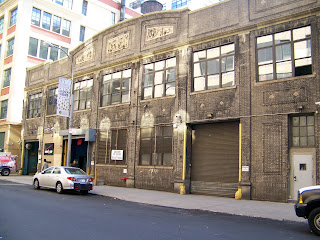
Paradise Garage
From Wikipedia, the free encyclopedia
The Paradise Garage was a discotheque notable in the history of modern gay and nightclub cultures and in dance and pop musics[1] [2]. It was founded by Michael Brody and Mel Cheren and was located at 84 King Street, New York City. It operated from 1977 to 1987 and was the base for DJ Larry Levan. Its name derives from its origins as a parking garage. The Paradise Garage's business model was largely inspired by David Mancuso's Loft parties: no liquor was served, there were no sales of food or beverages, and the club was not open to the general public.
The sound system was developed by Richard Long and Associates (RLA) and was said by those that attended to be the best in New York City at that time. The club has been credited for its influence on the development of the modern dance club as it is today: unlike other clubs of its time, the Paradise Garage was focused on dancing rather than social interaction, and it was the first to put the DJ at the center of attention.
Among those to benefit from what became known as "The Garage Sound" or "Garage Music" was West End Records, run by Mel Cheren. Among its successes were "Sessomatto" by Sessa Matto, Karen Young's "Hot Shot," "Heartbeat" by Taana Gardner (remixed by Levan) and "Don't Make Me Wait" by the Peech Boys (produced by Levan). West End Records folded for a number of years, re-opening in the late 90's and releasing one of Levan's DJ sets recorded live at the Garage. In the video game Grand Theft Auto: Vice City Stories, a post-disco radio station, Paradise FM plays music representative of the club's playlists at the height of its popularity. Tim Curry had a minor hit with a song about the club, also named "Paradise Garage."
The building which housed the Paradise Garage is now a facility for Verizon Communications.
Contents
Music
The unique and eclectic style of disco and dance musics played at the Garage gave rise to the descriptive terms "garage," "garage style" and "garage classic" (to describe a record that was made famous or is associated with the Paradise Garage). When the term "garage music" is used in reference to the Paradise Garage, it does not exclusively mean house music, although certain house tracks may be considered to be garage classics. House music as a genre got its start from the Garage's house DJ Larry Levan and his contemporaries, Frankie Knuckles and Nicky Siano who were both also influential disc jockeys. These disc jockeys played all kinds of music so long as it was danceable; at the Paradise Garage, one was liable to hear The Clash and The Police as well as traditional "disco" artists like Gwen Guthrie and Sylvester. Levan is remembered by all for his ability to choose and play different records from different types of music and make it all fit together. The term "garage" has changed meaning over time, see UK garage for a more detailed description.
Performers
- Gwen Guthrie
- Loleatta Holloway
- Peech Boys
- Grace Jones
- Phyllis Hyman
- Taana Gardner
- Sylvester
- The Weather Girls
- Chaka Khan
- Patti LaBelle
- Divine
- Madonna (who also filmed her first music video, "Everybody", here)
- The Pointer Sisters
- Wham!
- Kid Creole & the Coconuts
- Whitney Houston
- Karen Young
- Colonel Abrams
- Was (Not Was)
- D. Train
- Mr. Fingers
- Konk
- The System
- Peter Brown
- Liz Torres
- Tim Curry
- Dan Hartman
- Patti Austin
- Unlimited Touch
- One Way
- The Jones Girls
- Amanda Lear
- Samantha Fox
- First Choice
- Natalie Cole
- Betty Wright
- Miquel Brown
- Curtis Hairston
- Bonnie Pointer
- Luther Vandross
- Jocelyn Brown
- Siedah Garrett
- Meli'sa Morgan
- Stacey Q.
- Claudja Barry
- Sharon Redd
- Nu Shooz
- Frankie Smith
- France Joli
- Quando Quango
- Lime
- New Order
- Georgio
- Pattie Brooks
- Jennifer Holliday
- Evelyn Thomas
- Yaz
- Freeez
- Gary's Gang
Hi. Is it your photo of the Paradise Garage in NYC? Can I use it for non-commercial project with your copyright?
ReplyDelete